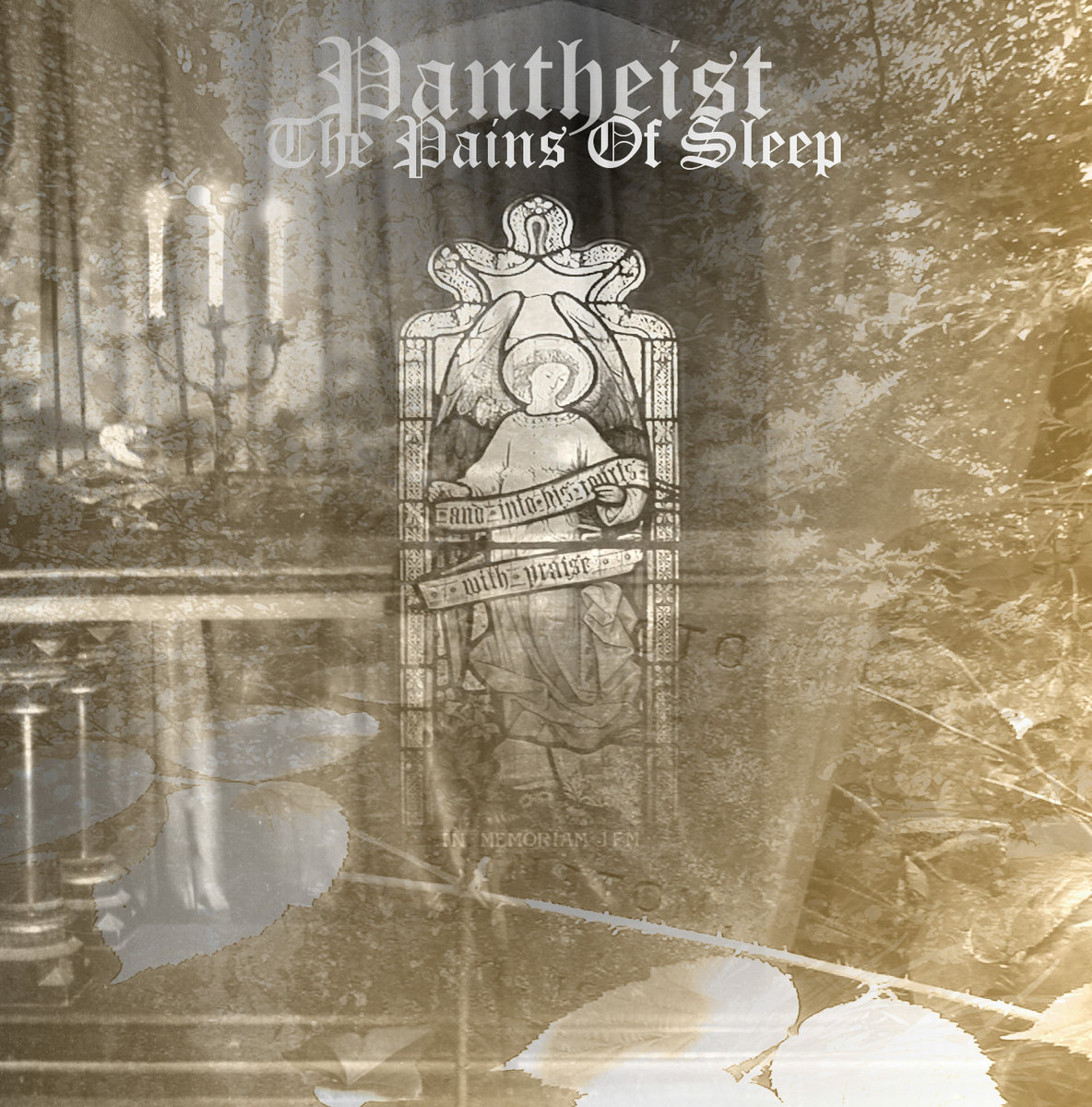Here is a band that needs no introduction, so I’ll get straight to the point. Pantheïst’s The Pains of Sleep is a remarkable EP that showcases the band’s unique ability to merge profound lyrical themes with lush, expansive compositions. Released in 2005, this record is a testament to the power of funeral doom as an extremely expressive and profoundly impactful art form. With a combination of original compositions and remastered early material, this EP serves as a special gift, filled with familiar, but refined tracks for devoted fans. It is my favourite Pantheïst release and one of my favourite funeral doom releases of all time as well.
Atmosphere and Themes
From the first moments of the title track, it’s clear that The Pains of Sleep is deeply invested in creating an immersive atmosphere. The use of church organs, orthodox chanting, and layered instrumentation evokes an almost liturgical solemnity, grounding the EP in a sense of the sacred. Yet, this reverence is contrasted by raw emotional intensity, with lyrics that venture into various dark territories; anguish, guilt, and the relentless search for meaning in a world steeped in suffering.
In fact, much of the EP’s strength lies in its lyrical depth. Inspired by Samuel Taylor Coleridge’s poem of the same name, the title track sets the stage for a reflective journey that is equal parts personal as it is universal. Lines such as “Deeds to be hid which were not hid” convey a visceral sense of shame and inner torment, mirrored by the music’s mournful pace and climactic crescendos. As a whole, the lyrics plunge deeply into the torment of a restless and guilt-ridden mind. The imagery vividly conveys a spiritual and psychological struggle, oscillating between moments of supplication, self-reproach, and raw emotional catharsis… I think.
The Pains of Sleep invokes themes of existential despair, emotional isolation, and the human condition, especially its darker sides. The artists explore the futility of time, the unsettling nature of desire and divinity, death as a realm of peace and detachment from mortal woes, and profound loneliness, Together, the lyrics weave a narrative of introspection, painting a clear image of grappling with life’s bleakest moments and desperately holding on to fleeting glimpses of mental clarity.
Musical Brilliance
The EP’s crowning achievement lies in its ability to balance sonic heaviness with melodic beauty. This is no easy task, as anyone who has ever tried to create any sort of emotional extreme metal will tell you. Nowhere is this more evident than in Envy Us, a track largely based on the second movement of Beethoven’s Symphony No. 7. Pantheïst takes the famous allegretto’s haunting progression and transforms it into a funeral doom masterpiece —Yes, they did— Don’t ask me how, but they did it. The interplay between the original melody and the band’s characteristic melancholic riffs is seamless, elevating the track to a level of brilliance that feels both timeless and contemporary, even though I’m writing this almost 20 years after the release date. It’s a rare feat to incorporate such a well-known classical piece without it feeling derivative, yet Pantheïst achieves this with remarkable elegance. There is however a sad truth hidden in these words: The fact that a record from almost 20 years ago is still among the most progressive funeral doom releases out there. That speaks volumes about the band, but I can’t help but wonder if it also, more generally, speaks to a genre that has become too conservative and too set in stone. One thing is clear, Pantheïst were (and are) way ahead of their time. In fact, it can be said that in many ways they, along with the other pioneers of the genre, have altered the timeline and the very fabric of funeral doom metal. So the times today are what they are partly because of their influence.
Elsewhere, the EP explores a variety of moods and textures. The cover of Katatonia’s For Funerals to Come is a standout moment, offering a highly atmospheric interpretation of the original while staying true to its essence. The reworked tracks from Pantheïst’s 1000 Years demo retain their raw emotional core but are elevated by improved post-production. The result is a body of work that feels cohesive despite its varied origins. It is worth noting that, if I’m not mistaken, a total of 6 tracks are taken from the 1000 Years demo (tracks 4 – 9) and are featured in the exact same order as before. It is not my intention to dive deeply into each and every track, I am attempting to draw out a few highlights that have stuck with me throughout the years and paint a holistic picture of my impression from this album.
Production and Performances
The production on The Pains of Sleep is as integral to its identity as the compositions themselves. Every element—from the deep, resonant vocals to the cascading organ tones—is meticulously balanced, creating a rich sonic tapestry that envelops the listener in an atmosphere of profound melancholy and introspection, drawing them deeply into the music’s emotional and thematic depths. Kostas’s vocals are particularly compelling, with the interplay between his guttural growls and Andy’s melodic chants delivering a performance imbued with both sincerity and gravitas.
The performances by the rest of the band are equally impressive. The guitars weave between crushing riffs and delicate melodies, while the rhythm section provides a solid foundation without overwhelming the nuanced arrangements. Special mention must be made of the use of keyboards and organs, which are integral to the EP’s distinctive sound, adding layers of depth and an almost cinematic quality. Oh, and it’s well worth mentioning that the guitars are exceptionally fuZzy and the sound in general is BIG. I’ve always been fascinated by the idea of “a wall of sound”, but more often that not the term is synonymous with bad production quality. Well, if you listen to this EP for 30 seconds you will quickly realize that a wall of sound and sonic clarity can live side by side in perfect harmony, given the right conditions.
A Lasting Impact
The Pains of Sleep is a statement of artistic intent where nothing feels out of place. Pantheïst demonstrate their mastery of funeral doom by pushing the boundaries of the genre, incorporating classical influences, and crafting music that feels both deeply personal and universally resonant. It’s a work that demands attentive listening, rewarding those who are willing to immerse themselves in its bleak yet beautiful world. For fans of funeral doom, The Pains of Sleep is an essential listen. For those unfamiliar with the genre, well, it is also an essential listen! Almost two decades later, it remains a towering achievement, a reminder of the power of music to explore the darkest corners of the human soul while offering a glimmer of transcendence.
I’ve always been drawn to bands that venture to the fringes of genres and push boundaries. As a long-time fan of progressive rock, where classical music plays a significant role, I appreciate how Pantheïst incorporates similar elements in their own unique way. Speaking of classical music, I like to imagine what Beethoven would have thought of the peculiar arrangement of his work featured on this album. However, it is unclear to me whether he would have appreciated it more before or after he went deaf.
I, on the other hand, am very grateful that my hearing is intact.
Merry Christmas, Kostas!
–Jón
Credits
Kostas Panagiotou – Vocals, Keyboards
Andy Semmens – Vocals
Mark Bodossian – Vocals, Bass
Ilia Rodriguez – Guitars, Vocals
Nicolas Tambuyser – Guitars
Lawrence van Haecke – Bass
Sterghios – Drums
Cheryl Panagiotou – Cover Art

